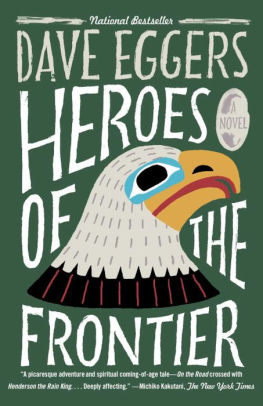
I don’t like writing negative reviews. I know how difficult writing a book is, and I am loath to disparage anyone’s attempts. I read Eggers’ A Heartbreaking Work of Staggering Genius, and enjoyed it, so I know he’s capable of terrific writing. But this novel seems a lazy throw-away attempt and it’s neither compelling nor believable. Had I not been reading this as a judge for The Mako Prize, I never would have finished it.
The story is simple. Josie decides to run away from life, fleeing Ohio to go on an adventure in Alaska with her two children, Anna (age 5) and Paul (age 8). She’s not equipped for such an adventure, she has no idea what her plan will be, and is not the kind of resourceful person who can wing it. In other words, she’s going on the kind of trip where people end up being featured in the Darwin Awards.
I’ve read my Thomas Foster and my Joseph Campbell, so I recognize a quest when I see one. As Foster says, the real purpose for every single quest is self-knowledge. Josie, however, learns nothing about herself. She’s just as deluded and pathetic at the end as at the beginning. In fact, her final act in the book nearly gets herself and her two children killed through sheer stupidity. Sorry for the spoiler, but I can’t imagine you’d read to the end anyway.
I kept waiting for signs that Eggers was writing ironically, that Josie was meant to be a subject worthy of ridicule, but it never came. Apparently we’re intended to take her seriously.
The most annoying aspect is that Josie believes herself to be “radically enlightened,” and she spends an inordinate amount of time judging everyone else in her life–the classic victim mentality. But she’s not enlightened; she’s a self-involved, irresponsible, drunken fuck-up.
Very little about the novel is believable. I know nothing about Alaska, but other readers have mentioned that Eggers gets nearly everything wrong about the state. And vast stretches of the dialogue are hard to swallow. But I do know music, and the long-winded section near the end where Josie is apparently an idiot-savant composer, translating what’s in her head semi-verbally to a hootenanny ensemble, generating something “profound” after a few minutes, is baffling. It’s especially baffling when mere pages earlier she admits knowing absolutely nothing about music, not even knowing which instruments make which sounds. Every musician who reads that passage will retch.
The capper for me is her (or Egger’s) irrational hatred of cyclists. The self-righteous hatred of everything Josie or Eggers doesn’t like is galling. The worst book I’ve read in years. I can’t dislike it any more than I do unless one forced me to read it again.
The story is simple. Josie decides to run away from life, fleeing Ohio to go on an adventure in Alaska with her two children, Anna (age 5) and Paul (age 8). She’s not equipped for such an adventure, she has no idea what her plan will be, and is not the kind of resourceful person who can wing it. In other words, she’s going on the kind of trip where people end up being featured in the Darwin Awards.
I’ve read my Thomas Foster and my Joseph Campbell, so I recognize a quest when I see one. As Foster says, the real purpose for every single quest is self-knowledge. Josie, however, learns nothing about herself. She’s just as deluded and pathetic at the end as at the beginning. In fact, her final act in the book nearly gets herself and her two children killed through sheer stupidity. Sorry for the spoiler, but I can’t imagine you’d read to the end anyway.
I kept waiting for signs that Eggers was writing ironically, that Josie was meant to be a subject worthy of ridicule, but it never came. Apparently we’re intended to take her seriously.
The most annoying aspect is that Josie believes herself to be “radically enlightened,” and she spends an inordinate amount of time judging everyone else in her life–the classic victim mentality. But she’s not enlightened; she’s a self-involved, irresponsible, drunken fuck-up.
Very little about the novel is believable. I know nothing about Alaska, but other readers have mentioned that Eggers gets nearly everything wrong about the state. And vast stretches of the dialogue are hard to swallow. But I do know music, and the long-winded section near the end where Josie is apparently an idiot-savant composer, translating what’s in her head semi-verbally to a hootenanny ensemble, generating something “profound” after a few minutes, is baffling. It’s especially baffling when mere pages earlier she admits knowing absolutely nothing about music, not even knowing which instruments make which sounds. Every musician who reads that passage will retch.
The capper for me is her (or Egger’s) irrational hatred of cyclists. The self-righteous hatred of everything Josie or Eggers doesn’t like is galling. The worst book I’ve read in years. I can’t dislike it any more than I do unless one forced me to read it again.
 RSS Feed
RSS Feed
